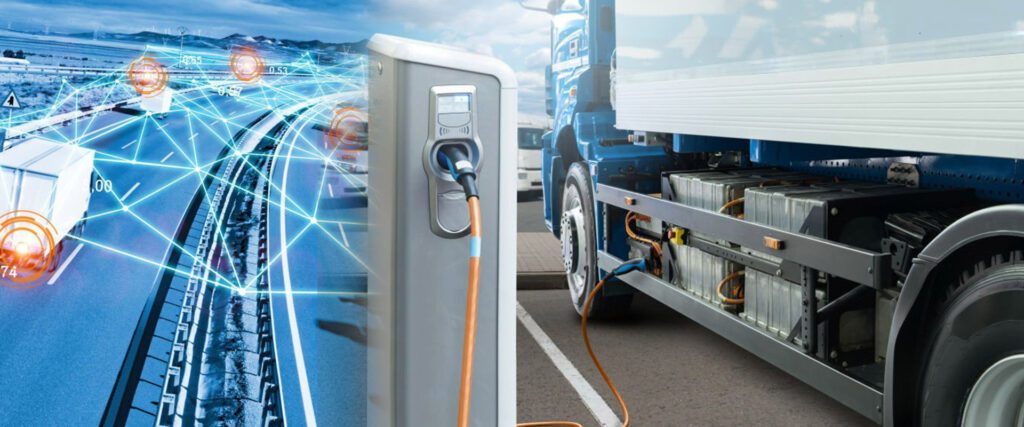The revolution of electric vehicles (EV) is imminent in the freight industry. A recent survey found that 90 percent of fleet managers described the future use of electric vehicles in the commercial fleet business as inevitable.
Calstart, a national nonprofit organization, estimated that the number of electric truck models will reach 195 by 2023, double the number of available models in 2019. In fact, zero-emission vehicles are on the verge of a significant rise in the US and Canada.
You would be surprised to know that the trucking industry is far ahead in embracing electric vehicles compared to other automobile sectors. However, only commercial vehicles, buses, and medium-duty trucks are increasingly getting adopted as they are reaching Total Cost of Ownership (TCO) parity with internal combustion engines in the present.
On the other hand, long-haul, heavy-duty trucks are expected to reach TCO parity by 2030. Hence, it will not be a quick transition for these types of electric trucks.
Advantages of an electric truck include zero emissions, very little sound, and low total cost of ownership (TCO). An electric truck may cost two to three times what a conventional truck costs, but over its service life, it saves you money. The fuel and maintenance cost is lower, and both drivers and bystanders enjoy a quieter environment.
Maintaining a fleet of vehicles is quite costly and exhausting. Electric vehicles help truck owners and fleet managers save money and are less arduous to maintain.
Why Is the Revolution of Electric Vehicles Imperative for the Trucking Industry?
Without a doubt, electric vehicles are going to reshape the future of the trucking industry. However, there is always room for improvement. The trucking industry and EVs can go even further with minor tweaks. Let us understand why the revolution of electric vehicles is crucial for the trucking industry.
The demand and supply of electric vehicles are evident. Leading companies like Scania and Mercedes Benz are geared up to make new models of electric freight vehicles.
We have already heard of Tesla—the leading manufacturer of electric vehicles. Even automobile companies such as Honda, Toyota, BMW, etc., are making zero-emission cars.
Electric vehicles are all set to power change in the freight industry. Medium-duty trucks for short journeys are catching up rather quickly to the trucking industry than personal vehicles. But have you ever wondered what is causing the widespread adoption of EVs in the freight industry? Initially, there are two main reasons: zero emission and financial viability.
Unfortunately, we live in a world where air pollution is significantly increasing and has become a major concern for the entire population. Each passing day, the temperatures are rising, the arctic ice is melting, and the sea levels are increasing.
In fact, it has been estimated that by 2050, the sea level will rise by five to nine inches, radically impacting the major coastal cities. Reducing carbon emissions is the only possible way to prevent this life-threatening catastrophe. And to accomplish that, adopting electric vehicles is one of the first ways forward.
Several companies comply with respective governments’ regulations to reduce carbon emissions. In fact, some companies have come up with their own plans to make the world greener and safer for future generations. That is why we are witnessing a significant change in the trucking industry.
But, the burning question is, why in the trucking industry specifically? Why can we not see this change in personal vehicles? Well, this is where the second reason comes in—money. No matter how environmental-friendly electric vehicles are and help make the world greener, not many people can invest in this exorbitant technology.
Important Aspects in Which EVs Revolutionize the Trucking Industry
The revolution of electric vehicles is crucial, and it lies upon three important aspects; low fuel cost, low maintenance cost, and low overall cost. Let us discuss these aspects briefly:
Low Fuel Cost
The fuel cost is much lower when you use electric vehicles. EVs spend less on fuel than internal combustion engine vehicles. According to a study in 2020, electric vehicle owners spend 60 percent less on fuel compared to traditional vehicles.
Seeing how rapidly electric trucks are replacing traditional trucks in the freight industry should suffice to predict the future of EVs.
Low Maintenance Cost
No truck owner can avoid maintenance costs as it will be a recurring expense for the company. And, it is quite expensive. With EVs, you wouldn’t need to fret about engine sludge, oil filters, cleaning fuel injectors and filters, air filters, spark plugs, ignition coils, mufflers, timing belts, etc.
We understand that all of this maintenance work requires a lot of money. However, EV owners do not need to worry about these things. A study by We Predict showed that EV owners spend 31 percent less on maintenance for electric cars and light trucks.
Overall Low Cost
Combine low fuel and low maintenance cost and you will quickly realize that the overall cost of a fleet of electric vehicles is significantly lower than traditional trucks. When the overall cost is reduced, managing a fleet of vehicles becomes easier. A significant increase in the bottom line is also expected.
This is the primary reason why the trucking industry is gradually considering moving towards adopting electric vehicles and replacing them with traditional trucks.
How to Increase Demand for EVs in the Trucking Industry?
We already know that electric vehicles have taken the market by storm more than personal vehicles. However, EVs have a few challenges as they strive harder to make the world greener and safer.
The trucking industry can prosper if truck owners recognize and overcome these challenges. Below, we have listed some ways to drive the demand for EVs in the trucking industry:
Reducing Battery Costs
Batteries are one of the most costly components of electric vehicles. You would be surprised to know that the battery cost is more than the current price of a hybrid Mercedes Benz. That is how expensive electric vehicle batteries are. Reducing the battery costs can increase demand for EVs in the trucking industry.
Setting Up Charging Infrastructure
The shortage of charging stations is one of the key challenges to owning electric vehicles. In the US, the electric vehicle stock is anticipated to increase by 26 million by 2030. More charging stations need to be set up from 216000 to 2.4 million to leverage the massive amount of EVs.
Spreading Awareness
We have already established that electric vehicles are less expensive and more environmentally friendly for the trucking industry. This information should suffice to drive truck owners towards adopting EVs. Spreading awareness can increase the demand for EVs to a greater extent.
Conclusion
It would be safe to say that electric vehicles have already become the next big thing. With the right technology such as a powerful cloud-based TMS software, the revolution of electric vehicles is just around the corner.
Having said that, electric trucks would have to prove that they can withstand tough road conditions. A proper charging infrastructure needs to be set up to handle the expected volume of trucks. Also, technicians need to be provided with specialized training so they can work on these trucks.
The total cost of ownership over an electric truck’s lifetime is lower but fleet buyers may hesitate to invest in them as the initial cost is two to three times higher than commercial trucks.
To make electric truck adoption seamless in the freight industry, the government needs to provide subsidies for the use of electric trucks for a period of time, until advanced technology lowers the cost of operation.



